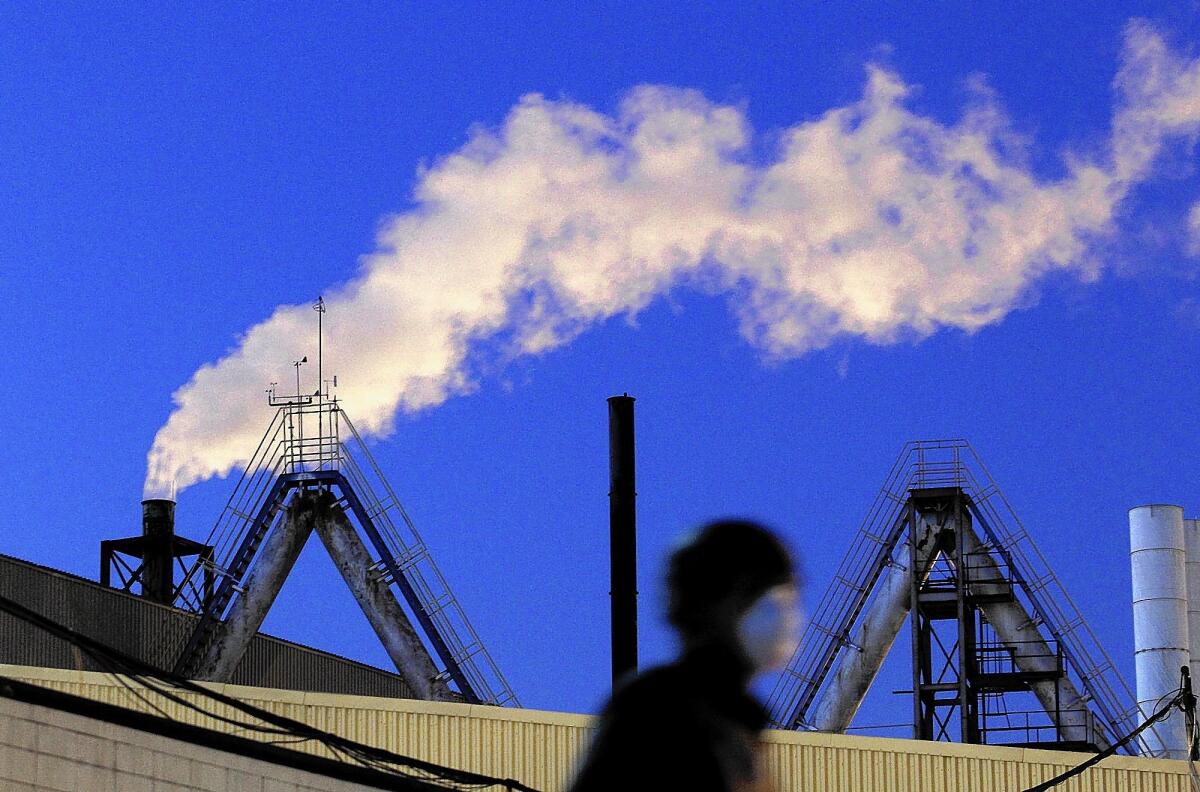Vernon battery recycler is allowed to reopen, with conditions

- Share via
Air quality officials are giving a battery recycling plant in Vernon another chance to prove it can operate without putting nearby residents at risk.
Despite demands from community groups calling for permanent closure of the Exide Technologies plant, the region’s air quality hearing board approved an agreement Thursday that would allow the idled facility to reopen, but only after it installs equipment to control arsenic emissions and takes steps to keep lead-contaminated dust from being released during the upgrades.
“The ultimate victors here are the people who breathe the air in and around the Exide facility,” said Kurt Wiese, general counsel for the South Coast Air Quality Management District.
Exide executives said they expect to finish construction by the end of the year.
“I’m confident that the equipment we’re putting in will allow us to achieve the new air quality standards we’re being held to,” said Thomas Strang, Exide’s vice president for environmental health and safety.
The abatement orders were approved by the air district’s administrative law panel a day after a four-hour public hearing in Maywood.
At the court-like proceeding Wednesday evening, dozens of community members and elected officials voiced concerns about health effects from the plant’s emissions. They urged regulators to do everything in their power to close the facility.
“If this company were anywhere else, like Pacific Palisades or Beverly Hills, this would not be happening,” said Maywood Mayor Oscar Magana. “Exide would be shut down.”
Other speakers faulted regulators for giving the plant a path to reopen near low-income neighborhoods of southeast Los Angeles County that have long endured greater environmental ills because of their proximity to manufacturing facilities and industrial sites.
The Exide plant has provoked community outrage since March 2013. A health study released by the air district found arsenic emissions from the Exide plant posed an elevated cancer risk to 110,000 people in communities stretching from Boyle Heights to Huntington Park.
The plant, about five miles southeast of downtown Los Angeles, has been cited more than 30 times by the air district over the last two years, mostly for emitting too much lead.
Exide suspended operations in March because it could not meet new air district requirements to maintain negative pressure in its furnaces. Those rules are designed to prevent toxic air contaminants from seeping into surrounding neighborhoods.
Exide had sought a variance from that requirement, but the air district’s hearing board and a Los Angeles County Superior Court judge denied the company’s request.
Air district officials said the deal marks a significant step forward by securing public health protections that go beyond the agency’s requirements.
Exide, for instance, must pay for a third-party environmental consultant, hired by the air district, to oversee dust-control measures during construction and provide weekly status reports to be posted online.
As part of a related settlement agreement signed between Exide and the air district, the company has agreed to drop its lawsuit challenging regulations the air district approved in January. The air district is allowed to proceed with a lawsuit seeking $40 million in civil penalties from Exide for a series of past air pollution violations.
To comply with the orders, Exide plans to spend $5 million to revamp the facility’s pollution capture and treatment system.
The Vernon plant typically operates around the clock seven days a week, processing about 25,000 automotive batteries each day. The facility is one of only two lead acid battery smelters west of the Rocky Mountains.
Mynor Godoy, a member of the Boyle Heights Neighborhood Council, said he feared that if Exide is allowed to reopen, it will go back to violating pollution rules and putting nearby residents at risk.
“We welcome these new safeguards for the community,” he said, “but we’ve suffered enough already.”
Twitter: @tonybarboza







